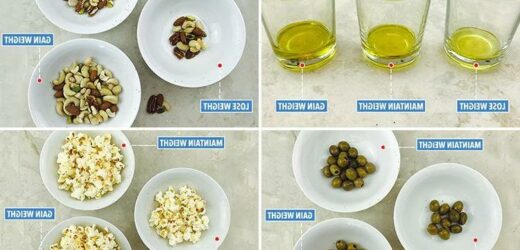YOU may be armed with the best of intentions, a snack draw brimming with "healthy" treats.
But with no understanding of portion control, you could be eating as many as 300 EXTRA calories a day, sabotaging your dieting dreams.
The rise of the clean eating trend has given way to people opting for popcorn and whole foods like nuts, dark chocolate and nut butters in a bid to keep up energy levels between main meals.
But experts are warning these healthy snacks can still wreak havoc with your waistline.
This set of pictures, based on NHS guidelines, offers a handy visual guide to how much of your favourite healthy treats you should actually be eating.
And it reveals the best portion sizes depending on whether your want to lose, maintain or gain weight.
Julian Gaine, a nutritional adviser and the founder of portion control gadget MealKitt, told The Sun Online: "Portion control is a way of visualising and understand a size of a food group to consume for a meal or an entire day.
"We have kind of lost our way, plates are bigger, spoons are bigger, portions are bigger, everything is becoming kind of supersized over the last few years.
"This is getting people to understand what a portion size is rather than what it has become."
Julian said portion control is an alternative to counting your daily calories because it allows you to understand how much of a food you can eat.
He said: "If you start calorie counting and weighing food it can become a bit of a chore and you can become obsessive.
"But portion control, for me, is a way of life and something that is definitely sustainable."
He explained that if people are unaware of the correct portion size for their snack, both health and unhealthy foods tend to be eaten in excess.
Julian added: "Sometimes we think, even with foods that are good for us like nuts and think 'oh wow these things are absolutely fantastic for us'.
"And it is good for us, but the reason portion control is so important when it comes to putting on weight or not putting on weight is understand how much of even good foods we should be eating.
"One of the things I see is nuts and fruit.
"A handful of nuts can be between 100 and 200 calories and a bag of nuts, everybody goes through them just nibbling at them, they are 500 or 600 calories right there.
"And fruit, even though it is a natural sugar, it is still a sugar."
HOW MUCH YOU SHOULD EAT TO LOSE, GAIN, OR MAINTAIN WEIGHT
According to the experts at MealKitt here’s what you should be eating if you want to lose weight, gain weight or maintain your weight…
Lose weight:
To lose weight your diet should be:
- 45 per cent protein
- 35 per cent fat
- 20 per cent carbs
- Consist of 1,400 calories per day for a woman and 1,900 calories per day for a man
Gain weight:
To gain weight your diet should be:
- 30 per cent protein
- 20 per cent fat
- 50 per cent carbs
- Consist of 2,600 calories per day for a woman and 3,100 calories per day for a man
Maintain weight:
To maintain weight your diet should be:
- 30 per cent protein
- 30 per cent fat
- 40 per cent carbs
- Consist of 2,000 calories per day for a woman and 2,500 calories per day for a man
The MealKitt kitchen app was developed by a personal trainer and aims to help people make better choices when it comes to portion control.
Julian explained that most fad diets rely heavily on portion control, so it is important to know how much of a particular food group you should be eating so you can stick to your chosen diet.
MOST READ IN HEALTH
FUZZY FUTURE HALF of adults will suffer from short-sightedness in less than 30 years
Get the lowdown on female sterilisation, from how it works to whether or not it is reversible
From STIs to chafing, what your itchy testicles REALLY mean (and when you should be worried)
Your dentist gives each tooth a number – and here’s what they could mean for your health
Why we need to eat a balanced diet
Eating a balanced diet is an essential part of maintaining a healthy weight, which is an important part of overall health.
The more unbalanced our diet is the more likely we are to be obese.
In the UK about one in four adults are considered obese as are about one in five kids.
Being obese comes with a range of health risks including:
- type 2 diabetes
- heart disease
- some types of cancer
- stroke
- high blood pressure
- liver and kidney disease
- high cholesterol
- asthma
The best way to treat obesity is a healthy, reduced-calorie diet with regular exercise.
Source: NHS
Source: Read Full Article






















